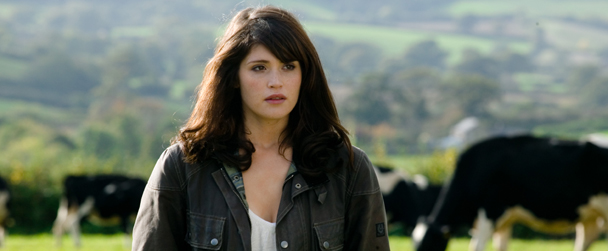Tamara Drewe
The countryside calm is abruptly ended by the return of the prodigal village girl Tamara – a once homely child who has now blossomed into a beautiful, successful journalist.
Plot summary
When Tamara Drewe sashays back to the bucolic village of her youth, life for the locals is thrown upside down. Tamara-once an ugly duckling-has been transformed into a devastating beauty. As infatuations, jealousies, love affairs and career ambitions collide among the inhabitants of the neighboring farmsteads, Tamara sets a contemporary comedy of manners into play using the oldest magic in the book-sex appeal.

Tamara Drewe is a pastoral romp rooted in a very English way of life. It takes Posy Simmonds’s graphic novel of the same name as a storyboard, a source that, in its turn, was based upon Thomas Hardy’s classic 1874 novel Far From the Madding Crowd. The story takes place in rural Dorset, where meek middle-aged Beth Hardiment (Tamsin Greig) runs a writer’s retreat and caters to the whims of her crime writer husband, Nicholas (the deliciously sleazy Roger Allam). The countryside calm is abruptly ended by the return of the prodigal village girl Tamara (Gemma Arterton) – a once homely child who has now blossomed into a beautiful, successful journalist.
Tamara has only come back to renovate the house left to her in her mother’s will, but she can’t resist flaunting her new good fortune in front of those who once dismissed her for being plain. All it takes is a pair of very short shorts and the occasional bat of her eyelids to have the local male populace groveling at her feet, much to the disgust of Jodie and Casey, two bored teenage girls with nothing to do and nowhere to go. They dub the surgically enhanced Ms. Drewe ‘Plastic Fantastic’ and devote their spare time to spying on her and trying to sabotage her prolific romances. They act – in a suitably Hardy-esque manner – as a gossipy Greek chorus for the sleepy village of Ewedown.
The title Tamara Drewe suggests an in-depth look at the heroine, but actually the film plays out as an almost soap-operatic ensemble piece. There’s an American Hardy scholar, Glen (Bill Camp), who seeks ease his writer’s block in the countryside but finds that the surroundings unleash more than just words; Andy (Luke Evans), the brawny rustic who has a quiet hankering for Tamara; and upstart Ben Sergeant (Dominic Cooper), a drummer in a rock band who is seduced by Tamara’s interview technique.
The script divides its time evenly between the old and young characters, and I found that my enjoyment of the scenes featuring more senior actors was much greater than those that didn’t. When Tamsin Grieg plays Beth, she strips herself of all vanity and totally inhabits the part of a dowdy, unhappy wife; meanwhile, one gets the sense that the relatively callow Arterton is limited to playing self-consciously gorgeous young sexpots because that’s all she’s capable of at this stage in her career. She reminds me of Kiera Knightley, another actress who prefers to pout rather than diversify her roles. The same can be said of Dominic Cooper, who seems determined to carve himself a niche as a popinjay lover. Both do their parts to the letter, but there is something oddly charmless about the pair of them.
When these two are off-screen, however, there is much to enjoy. The setting is gloriously bucolic, but Tamara Drewe doesn’t always romanticize country life: a livestock-worrying dog is given short shrift, and geese are slaughtered when it’s market time – much to Ben’s city-boy horror. Jodie and Casey spend their time in a graffiti-strewn bus shelter leafing through gossip rags and fantasizing about hunky Ben licking what they call their “teapot-lids.” Their boredom and frustration with life in the sticks is palpable, and very realistic. You can almost feel the slowness of their existence, dragging on; it’s no wonder they envy glamorous Tamara.
There are a series of twists and turns in everyone’s romantic lives, and Tamara ends up making mistakes that (distantly) echo those of her literary predecessor Bathsheba Everdene. There is an amusing end in store for one of the more villainous characters, which was thoroughly enjoyable and entirely unexpected. The pomposity and uncertainty of the authors who gather at the writer’s retreat is efficient skewered, providing an abundance of comedic fodder for anyone who appreciates just how inherently ridiculous writing for a living can be.
At times, the film’s overall fascination with voluptuous country maidens and their earthy trysts threaten to make this feel rather like a DVD that the Mail on Sunday might give away to its readership on a lazy day, but the acting chops of Grieg, Allam and Camp save Tamara Drewe from this vaguely disquieting fate. I do wonder whether Stephen Frears is settling into a reactionary old age, what with his recent homage to royalty (The Queen) and evident affection for a conservative, traditional way of life. But no matter: Tamara Drewe is a solid piece of filmmaking. If you’ve got a Gran who, if given enough sherry, will embrace the bawdier moments, this’ll make for an entertaining family film to watch on a Boxing Day afternoon.











COMMENTS